英语必修一 Unit3知识点总结
- 格式:doc
- 大小:74.00 KB
- 文档页数:11
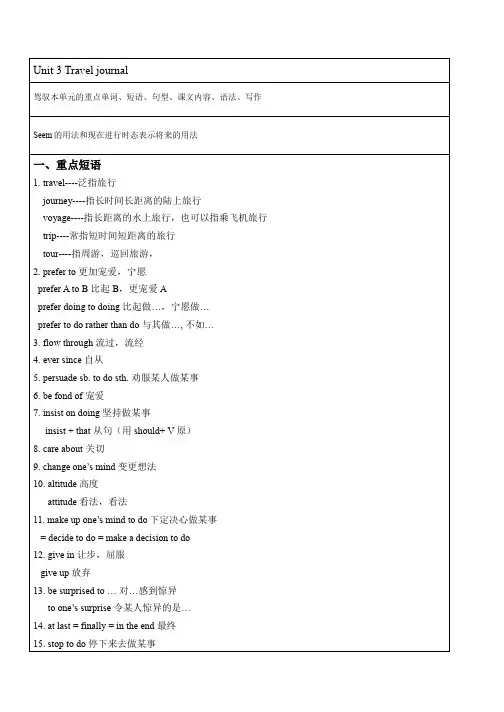
stop doing 停止做某事16. as usual 像平常一样17. so…that 如此… 以至于…So + adj + a/an + n. + thatSuch + a/an +adj. + n. + that18. be familiar with 对…熟识(人作主语)be familiar to 为…所熟识(物作主语)二、学问要点1. Which kind of transport do you prefer to use: bus or train?prefer v.更宠爱;选择某事物(而不选择其他事物)(1)prefer sth.更宠爱……prefer (sb.) to do sth.更宠爱(某人)做……prefer that更宠爱[that从句中常用(should)+动词原形]prefer sth./doing...to sth./doing...与……相比更宠爱……;宁愿……,不愿……e.g. I would prefer meat to fish.我宠爱肉赛过(宠爱)鱼。
I prefer singing to acting. 我宠爱唱歌赛过演戏。
prefer to do...rather than do...宁可……也不……e.g. He prefers to stay at home rather than go shopping.他宁可呆在家里也不情愿去逛商店。
(2)preference n. 偏爱;爱好;宠爱give preference to sb./sth.给……以实惠;优待2. Then she persuade me to buy one.然后她动员我也买了一辆.persuade vt.劝服; 劝服; vi.被劝服persuade sb. (not) to do sth.persuade sb. into / out of doing sth.e.g. I persuaded him to do it. = persuade him into doing it.我已劝服他做这件事。
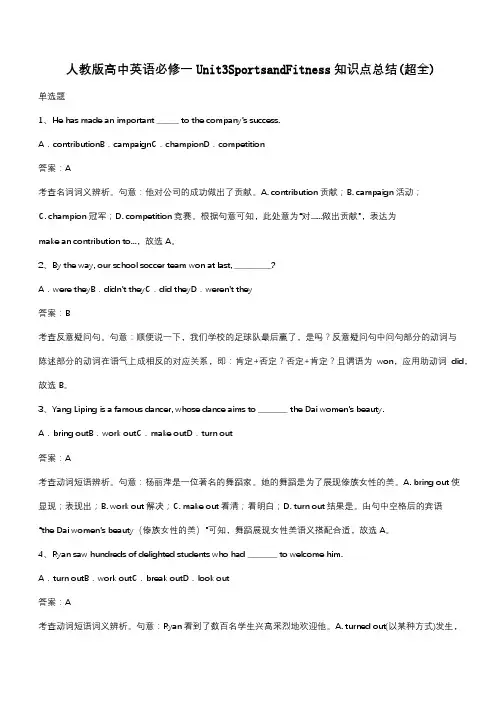
人教版高中英语必修一Unit3SportsandFitness知识点总结(超全)单选题1、He has made an important ______ to the company’s success. A.contributionB.campaignC.championD.competition答案:A考查名词词义辨析。
句意:他对公司的成功做出了贡献。
A. contribution贡献;B. campaign活动;C. champion冠军;D. competition竞赛。
根据句意可知,此处意为“对......做出贡献”,表达为make an contribution to...,故选A。
2、By the way, our school soccer team won at last, __________?A.were theyB.didn't theyC.did theyD.weren't they答案:B考查反意疑问句。
句意:顺便说一下,我们学校的足球队最后赢了,是吗?反意疑问句中问句部分的动词与陈述部分的动词在语气上成相反的对应关系,即:肯定+否定?否定+肯定?且谓语为won,应用助动词did,故选B。
3、Yang Liping is a famous dancer, whose dance aims to ________ the Dai women’s beauty.A.bring outB.work outC.make outD.turn out答案:A考查动词短语辨析。
句意:杨丽萍是一位著名的舞蹈家。
她的舞蹈是为了展现傣族女性的美。
A. bring out使显现;表现出;B. work out解决;C. make out看清;看明白;D. turn out结果是。
由句中空格后的宾语“the Dai women’s beauty(傣族女性的美)”可知,舞蹈展现女性美语义搭配合适,故选A。
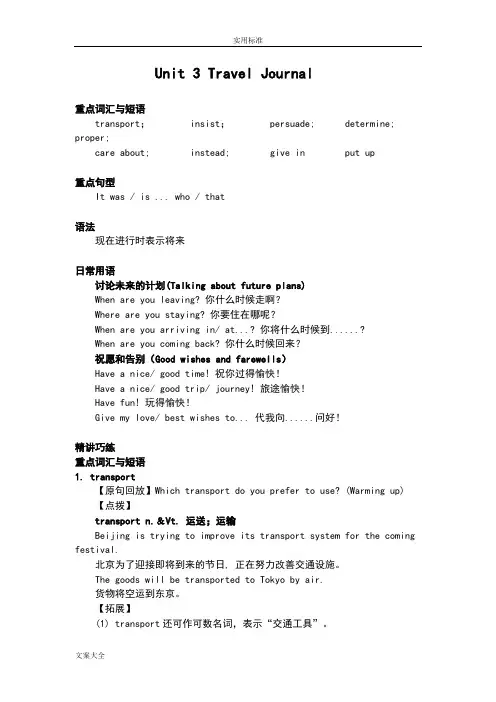
Unit 3 Travel Journal重点词汇与短语transport;insist; persuade; determine; proper;care about; instead; give in put up重点句型It was / is ... who / that语法现在进行时表示将来日常用语讨论未来的计划(Talking about future plans)When are you leaving? 你什么时候走啊?Where are you staying? 你要住在哪呢?When are you arriving in/ at...? 你将什么时候到......?When are you coming back? 你什么时候回来?祝愿和告别(Good wishes and farewells)Have a nice/ good time! 祝你过得愉快!Have a nice/ good trip/ journey! 旅途愉快!Have fun! 玩得愉快!Give my love/ best wishes to... 代我向......问好!精讲巧练重点词汇与短语1. transport【原句回放】Which transport do you prefer to use? (Warming up) 【点拨】transport n.&Vt. 运送;运输Beijing is trying to improve its transport system for the coming festival.北京为了迎接即将到来的节日, 正在努力改善交通设施。
The goods will be transported to Tokyo by air.货物将空运到东京。
【拓展】(1) transport还可作可数名词,表示“交通工具”。
例如:It is easier to travel if you have your own transport.如果你自己有交通工具,旅行起来就方便多了。
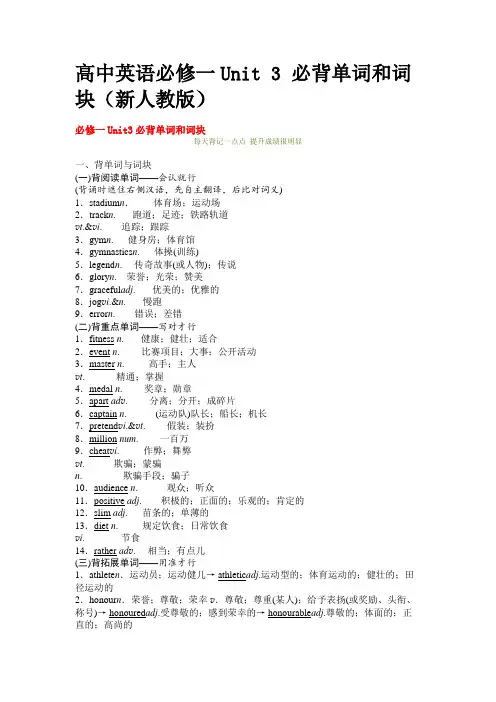
高中英语必修一Unit 3 必背单词和词块(新人教版)必修一Unit3必背单词和词块每天背记一点点提升成绩很明显一、背单词与词块(一)背阅读单词——会认就行(背诵时遮住右侧汉语,先自主翻译,后比对词义)1.stadium n.体育场;运动场2.track n. 跑道;足迹;铁路轨道v t.&v i. 追踪;跟踪3.gym n. 健身房;体育馆4.gymnastics n. 体操(训练)5.legend n. 传奇故事(或人物);传说6.glory n. 荣誉;光荣;赞美7.graceful adj. 优美的;优雅的8.jog v i.&n. 慢跑9.error n. 错误;差错(二)背重点单词——写对才行1.fitness n. 健康;健壮;适合2.event n. 比赛项目;大事;公开活动3.master n. 高手;主人v t. 精通;掌握4.medal n. 奖章;勋章5.apart ad v. 分离;分开;成碎片6.captain n. (运动队)队长;船长;机长7.pretend v i.&v t. 假装;装扮8.million num. 一百万9.cheat v i. 作弊;舞弊v t. 欺骗;蒙骗n. 欺骗手段;骗子10.audience n. 观众;听众11.positive adj. 积极的;正面的;乐观的;肯定的12.slim adj. 苗条的;单薄的13.diet n. 规定饮食;日常饮食v i. 节食14.rather ad v. 相当;有点儿(三)背拓展单词——用准才行1.athlete n.运动员;运动健儿→ athletic adj.运动型的;体育运动的;健壮的;田径运动的2.honour n.荣誉;尊敬;荣幸v.尊敬;尊重(某人);给予表扬(或奖励、头衔、称号)→ honoured adj.受尊敬的;感到荣幸的→ honourable adj.尊敬的;体面的;正直的;高尚的3.determine v t.决定;确定;下决心→ determination n.决心;决定→ determined adj.坚决的;有决心的4.injure v t.使受伤;损害→ injured adj.受伤的;有伤的→ injury n.伤害;损伤5.strength n.力量;体力→ strengthen v t.加强;巩固→ strong adj.强壮的;坚强的6.fail v i.失败;不及格;未能(做到)→ failure n.失败;失败的人(或事物) 7.compete v i.竞争;对抗→ competition n.竞争→ competitive adj.竞争的;有竞争力的→ competitor n.竞争者8.stress n.压力;紧张;重音v t.强调;重读;使焦虑不安v i.焦虑不安→stressful adj.压力重的;紧张的→ stressed adj.焦虑不安的[语境活用]1.I felt honoured to attend the party held by the honourable boss as an honoured guest. (honour)2.All the excited competitors who are relatively competitive are competingfor the honour of winning the gold medals in the competition.(compete)3.He felt he was a failure because he failed to live up to his parents' expectations. (fail) 4.Determined to become a top student, he determined to overcome more difficulties with courage and determination. (determine)5.Thestrong man, who constantly works out in the gym to strengthen his muscles, lifted up the heavy rock with all his strength. (strength)6.Thestressful studying conditions made her feel stressed,_resulting in her low grades. Maybe things can easily go wrong when people are under stress.(stress)(四)背高频单词——先“记牢”再“用活”,不背绝对不行n.压力;紧张;重音vt.强调;重读;使焦虑不安vi.焦虑不安5.stressⅠ单元短语再认再现1.come_along跟随;到达;进步;赶快2.lose_weight 减肥3.up_to_sb. 由某人决定4.work_out 锻炼;计算出;解决5.make_it 获得成功;准时到达6.set_an_example 树立榜样7.fall_apart 破裂;破碎;崩溃8.lose_heart 丧失信心;泄气9.give_up 放弃;投降10.make_sense 有道理;合乎情理;表述清楚11.pretend_to_do_sth. 假装做某事12.even_if/though 即使;虽然13.make_a_difference 有作用或影响14.rather_than 而不是15.instead_of 而不是;代替16.cut_...out 停止做(或使用、食用);剪下17.now_and_then 有时;偶尔18.compare_..._with/to_... 与……比较重点短语拓展用活二、背佳句与佳作(一)背写作佳句——多“输入”才能巧“输出”1.[教材原句] When Michael Jordan's feet left the ground, time seemed to stand still .(Sb./Sth. seems/seemed +不定式)2.[教材原句] A soccer player should not pretend to fall down even if it helps his/her team.(even if/though 引导让步状语从句)即使对自己的球队有帮助,一个足球运动员也不应该假装跌倒。

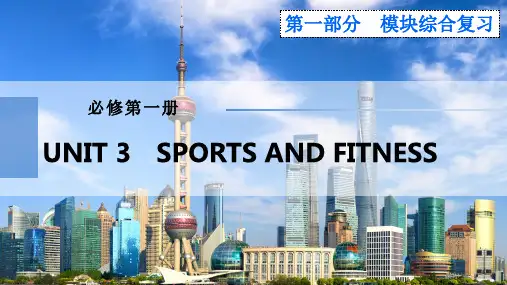
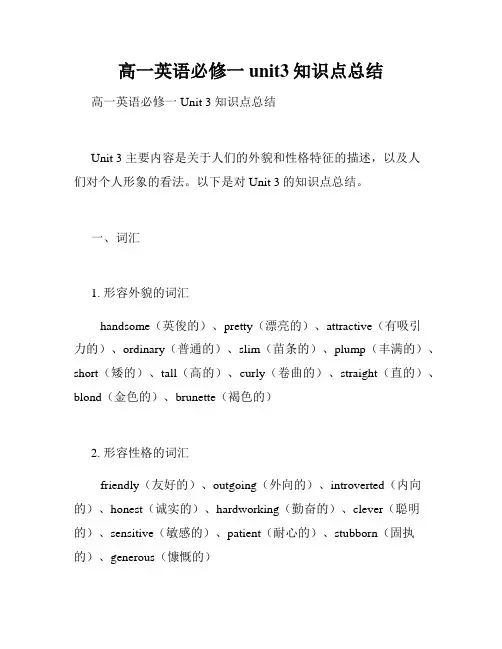
高一英语必修一unit3知识点总结高一英语必修一Unit 3 知识点总结Unit 3 主要内容是关于人们的外貌和性格特征的描述,以及人们对个人形象的看法。
以下是对Unit 3的知识点总结。
一、词汇1. 形容外貌的词汇handsome(英俊的)、pretty(漂亮的)、attractive(有吸引力的)、ordinary(普通的)、slim(苗条的)、plump(丰满的)、short(矮的)、tall(高的)、curly(卷曲的)、straight(直的)、blond(金色的)、brunette(褐色的)2. 形容性格的词汇friendly(友好的)、outgoing(外向的)、introverted(内向的)、honest(诚实的)、hardworking(勤奋的)、clever(聪明的)、sensitive(敏感的)、patient(耐心的)、stubborn(固执的)、generous(慷慨的)3. 运动和爱好的词汇swimming(游泳)、running(跑步)、dancing(跳舞)、singing(唱歌)、painting(绘画)、reading(阅读)、playing football(踢足球)、playing basketball(打篮球)4. 形容服装和外观的词汇fashionable(时尚的)、casual(休闲的)、neat(整洁的)、messy(凌乱的)、fit(合适的)、loose(宽松的)、tight(紧身的)、colorful(色彩丰富的)二、语法1. 形容词的比较级和最高级形容词的比较级表示两者之间的比较,最高级表示三者或三者以上之间的比较。
比较级的构成规则:在形容词后面加上-er,或者在形容词前面加上more;最高级的构成规则:在形容词后面加上-est,或者在形容词前面加上most。
如:tall(高的)- taller(更高的)- tallest(最高的)2. 副词的比较级和最高级副词的比较级和最高级的构成与形容词相似,但前面需要加上more或most。
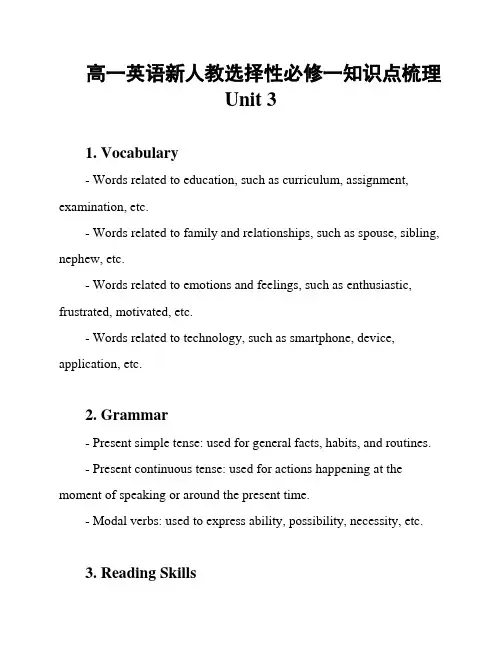
高一英语新人教选择性必修一知识点梳理Unit 31. Vocabulary- Words related to education, such as curriculum, assignment, examination, etc.- Words related to family and relationships, such as spouse, sibling, nephew, etc.- Words related to emotions and feelings, such as enthusiastic, frustrated, motivated, etc.- Words related to technology, such as smartphone, device, application, etc.2. Grammar- Present simple tense: used for general facts, habits, and routines.- Present continuous tense: used for actions happening at the moment of speaking or around the present time.- Modal verbs: used to express ability, possibility, necessity, etc.3. Reading Skills- Skimming: quickly reading the text to get a general understanding of the main ideas.- Scanning: searching for specific information in the text.- Understanding context: inferring the meaning of words or phrases based on the surrounding text.- Identifying main ideas: recognizing the main points or arguments in a passage.- Making inferences: drawing conclusions based on the information given in the text.4. Listening Skills- Listening for gist: understanding the main idea or topic of a conversation or lecture.- Listening for specific information: focusing on particular details or facts.- Note-taking: writing down important points or key details while listening.- Understanding context and tone: inferring meaning from the speaker's tone of voice or the overall situation.- Identifying supporting details: recognizing examples, explanations, or additional information provided.5. Writing Skills- Sentence structure: using subject-verb-object order in sentences.- Paragraph organization: organizing ideas into clear topic sentences and supporting details.- Coherence and cohesion: using connecting words and phrases to link ideas and create a logical flow.- Using descriptive language: incorporating adjectives, adverbs, and figurative language to make writing more engaging.- Avoiding repetitive language: using synonyms and varied vocabulary to avoid monotony.6. Speaking Skills- Asking and answering questions: using appropriate question forms and providing relevant responses.- Expressing opinions and preferences: using phrases like "I think," "I prefer," "In my opinion," etc.- Giving directions: providing clear instructions or explanations.- Describing experiences and events: using past tense and appropriate vocabulary to narrate personal experiences.- Engaging in conversations: maintaining a balanced exchange of ideas and actively listening to others.7. Cultural Knowledge- Education system in English-speaking countries.- Traditional and modern family structures.- Importance of leisure activities in Western cultures.- Use of technology in daily life.8. Test Preparation- Reviewing vocabulary and grammar concepts.- Listening to English audio and practicing note-taking.- Writing practice essays or paragraphs on different topics.- Engaging in speaking activities with classmates or language partners.9. Additional Resources- Online English learning platforms and websites.- English language podcasts and videos.- English language books and textbooks.- English language apps for vocabulary building and grammar practice.- Language exchange programs or conversation partners.10. Tips for Success- Set specific goals and create a study schedule.- Practice English consistently and regularly.- Engage in authentic English-language activities, such as watching movies or reading books.- Take advantage of available resources and ask for help when needed.- Stay motivated and maintain a positive attitude towards learning English.以上是关于"高一英语新人教选择性必修一知识点梳理 Unit 3"的知识点整理,希望对你的学习有所帮助!。
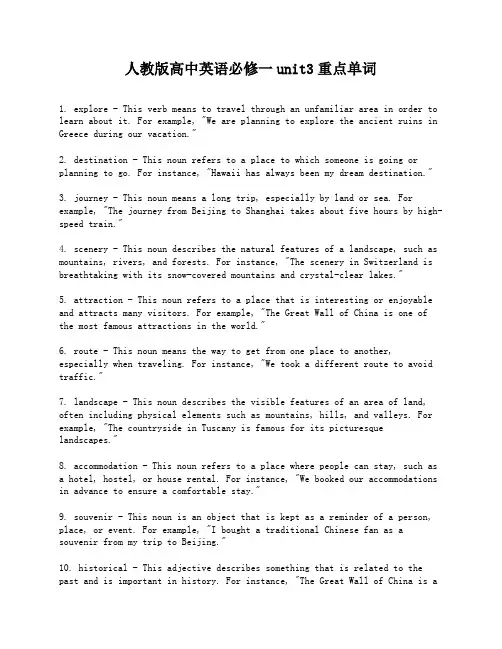
人教版高中英语必修一unit3重点单词1. explore - This verb means to travel through an unfamiliar area in order to learn about it. For example, "We are planning to explore the ancient ruins in Greece during our vacation."2. destination - This noun refers to a place to which someone is going or planning to go. For instance, "Hawaii has always been my dream destination."3. journey - This noun means a long trip, especially by land or sea. For example, "The journey from Beijing to Shanghai takes about five hours by high-speed train."4. scenery - This noun describes the natural features of a landscape, such as mountains, rivers, and forests. For instance, "The scenery in Switzerland is breathtaking with its snow-covered mountains and crystal-clear lakes."5. attraction - This noun refers to a place that is interesting or enjoyable and attracts many visitors. For example, "The Great Wall of China is one of the most famous attractions in the world."6. route - This noun means the way to get from one place to another, especially when traveling. For instance, "We took a different route to avoid traffic."7. landscape - This noun describes the visible features of an area of land, often including physical elements such as mountains, hills, and valleys. For example, "The countryside in Tuscany is famous for its picturesque landscapes."8. accommodation - This noun refers to a place where people can stay, such asa hotel, hostel, or house rental. For instance, "We booked our accommodations in advance to ensure a comfortable stay."9. souvenir - This noun is an object that is kept as a reminder of a person, place, or event. For example, "I bought a traditional Chinese fan as a souvenir from my trip to Beijing."10. historical - This adjective describes something that is related to the past and is important in history. For instance, "The Great Wall of China is ahistorical landmark that attracts millions of tourists each year."11. monument - This noun refers to a structure, such as a building, statue, or memorial, that is built to honor a famous person or event. For example, "The Washington Monument in Washington, D.C. is a well-known symbol of the United States."12. culture - This noun describes the beliefs, customs, arts, etc., of a particular society, group, or time. For instance, "Japan is known for its rich culture, including traditional tea ceremonies and beautiful kimono clothing."13. architecture - This noun refers to the art and practice of designing and constructing buildings. For example, "The architecture of the Taj Mahal in India is considered to be one of the most beautiful in the world."14. indigenous - This adjective describes something or someone that is native to a particular place or region. For instance, "The Maasai people are an indigenous tribe in Kenya."15. festival - This noun is a special time or event when people celebrate something, often with parties or public performances. For example, "The Spring Festival is the most important festival in China and is celebrated with fireworks, dragon dances, and family gatherings."16. cuisine - This noun refers to a style of cooking characterized by specific ingredients, techniques, and dishes associated with a particular culture or region. For instance, "Italian cuisine is famous for its pasta, pizza, and delicious gelato."17. picturesque - This adjective describes something that is visually attractive, especially in a quaint or charming way. For example, "The small village is nestled in a picturesque valley with colorful houses and cobblestone streets."18. traditional - This adjective describes something that is based on customs or ways of doing things that have been passed down through generations. For instance, "The traditional clothes in Korea, known as hanbok, are colorful and elegant."19. historic - This adjective describes something that is famous or important in history. For example, "The Colosseum in Rome is a historic amphitheaterthat was used for gladiator fights."20. diverse - This adjective describes something that includes many different types or elements. For instance, "New York City is known for its diverse population, with people from all over the world living and working there."21. spectacular - This adjective describes something that is very impressiveor exciting to look at. For example, "The Northern Lights in Iceland are a spectacular natural phenomenon that attracts visitors from around the globe."22. architecture - This noun refers to the art and practice of designing and constructing buildings. For example, "The architecture of ancient Egypt, including the pyramids and Sphinx, is still a wonder today."23. indigenous - This adjective describes something or someone that is native to a particular place or region. For instance, "The Aboriginal people of Australia are indigenous to the continent."24. festival - This noun is a special time or event when people celebrate something, often with parties or public performances. For example, "Carnivalin Brazil is a famous festival known for its colorful costumes, parades, and music."25. cuisine - This noun refers to a style of cooking characterized by specific ingredients, techniques, and dishes associated with a particular culture or region. For instance, "Thai cuisine is known for its spicy and aromatic dishes, such as pad Thai and green curry."26. picturesque - This adjective describes something that is visually attractive, especially in a quaint or charming way. For example, "The small town of Bruges in Belgium is often described as picturesque, with its historic architecture and canals."27. traditional - This adjective describes something that is based on customs or ways of doing things that have been passed down through generations. For instance, "The traditional music and dance of Ireland, such as step dancingand folk music, are popular around the world."28. historic - This adjective describes something that is famous or importantin history. For example, "The Acropolis in Athens is a historic site that includes the famous Parthenon temple."29. diverse - This adjective describes something that includes many different types or elements. For instance, "The Amazon rainforest in South America is home to a diverse range of plant and animal species."30. natural wonder - This noun refers to a natural feature or phenomenon that is remarkable and often considered to be one of the wonders of the world. For example, "The Grand Canyon in the United States is a natural wonder that attracts millions of visitors each year."31. world heritage site - This noun refers to a place that is listed by UNESCO as having outstanding universal value and is protected for future generations. For instance, "The Great Barrier Reef in Australia is a world heritage site known for its incredible marine life and coral reefs."32. local - This adjective describes something that is specific to aparticular area or region. For example, "Sampling local cuisine is a great way to experience the culture of a place."33. guidebook - This noun refers to a book that provides information and advice for travelers, often including details about attractions, accommodations, and transportation. For instance, "I consulted a guidebook to plan my trip to Peru."34. itinerary - This noun refers to a plan or schedule for a journey,including destinations, activities, and times. For example, "We followed a strict itinerary during our two-week tour of Europe."35. backpacking - This noun refers to the activity of traveling with a backpack, often on a budget and for an extended period of time. For instance, "Backpacking through Southeast Asia is a popular choice for many young travelers."36. road trip - This noun refers to a journey made by car, usually for pleasure and often covering a significant distance. For example, "We took a road trip along the famous Route 66 in the United States."37. cruise - This noun refers to a voyage on a ship for pleasure, often stopping at various ports along the way. For instance, "A cruise through the Caribbean offers the opportunity to visit multiple islands and experiencetheir unique cultures."38. eco-tourism - This noun refers to a form of travel that focuses onvisiting natural areas and promoting conservation and sustainability. For example, "Eco-tourism in Costa Rica allows visitors to explore the country's rich biodiversity while supporting local communities."39. adventure tourism - This noun refers to a type of travel that involves exploring remote or exotic destinations and participating in outdooractivities such as hiking, rafting, or climbing. For instance, "Adventure tourism in New Zealand offers experiences such as bungee jumping and skydiving."40. sustainable travel - This noun refers to travel that aims to minimize the negative impact on the environment and local communities. For example, "Choosing eco-friendly accommodations and using public transportation are ways to practice sustainable travel."。
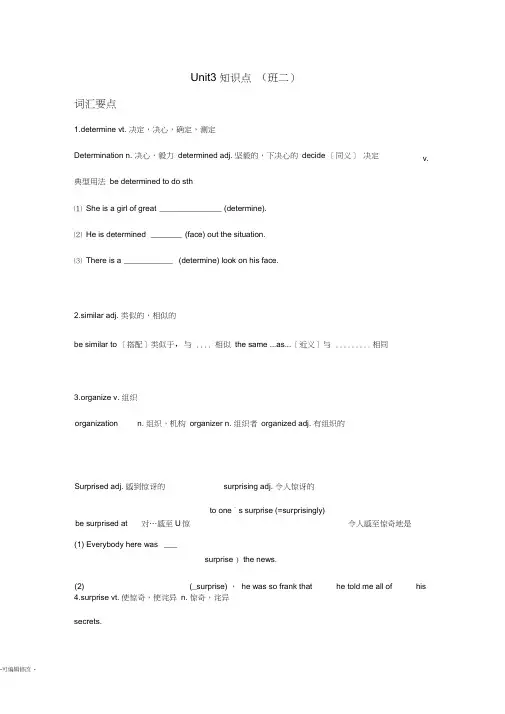
v. Unit3 知识点 (班二)词汇要点 1.determine vt. 决定,决心,确定,测定 Determination n. 决心,毅力 determined adj. 坚毅的,下决心的 decide [同义] 决定 典型用法 be determined to do sth ⑴ She is a girl of great ______________ (determine). ⑵ He is determined _______ (face) out the situation. ⑶ There is a ___________ (determine) look on his face. 2.similar adj. 类似的,相似的 be similar to [搭配]类似于,与 .... 相似 the same ...as...[近义]与 ......... 相同 anize v. 组织 n. 组织,机构 organizer n. 组织者 organized adj. 有组织的 4.surprise vt. 使惊奇,使诧异 n. 惊奇,诧异secrets.organization Surprised adj. 感到惊讶的 surprising adj. 令人惊讶的 be surprised at 对…感至U 惊讶 to one ,s surprise (=surprisingly) 令人感至惊奇地是 (1) Everybody here was ___ surprise ) the news. (2) (_surprise) , he was so frank that he told me all of his5..transport n.& v. 运送;运输派生:transportation n. 运输;交通工具6. persuade vt. 说服,劝说persuade sb. to do 说服/ 劝服某人去做persuade sb. into doing 说服/ 劝服某人去做persuade sb. out of doing 说服/ 劝服某人不做注意:劝而不服则要用advise sb.to do sth. 或者try to persuade sb.to do sth.⑴ 我们劝李老师戒烟,他不再抽烟啦!_____________________________ ,__a_nd he never smoked at last.⑵ 我们劝王老师戒烟,可他不戒。
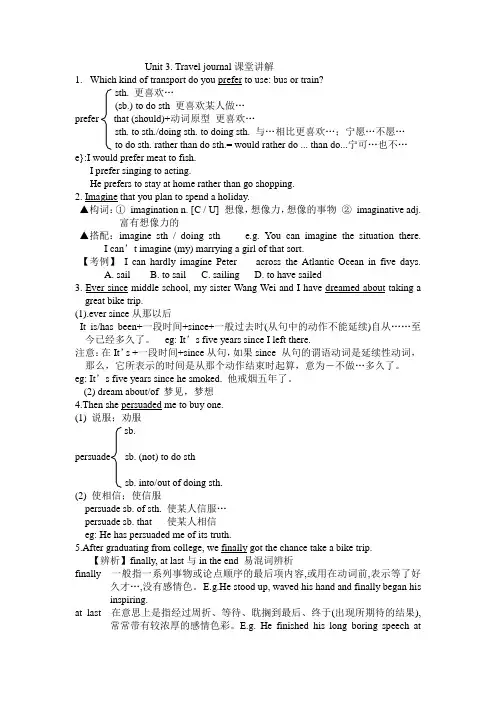
Unit 3. Travel journal课堂讲解1.Which kind of transport do you prefer to use: bus or train?sth. 更喜欢…(sb.) to do sth 更喜欢某人做…prefer that (should)+动词原型更喜欢…sth.to sth./doing sth. to doing sth. 与…相比更喜欢…;宁愿…不愿…to do sth. rather than do sth.= would rather do ... than do...宁可…也不…e}:I would prefer meat to fish.I prefer singing to acting.He prefers to stay at home rather than go shopping.2. Imagine that you plan to spend a holiday.▲构词:①imagination n. [C / U] 想像,想像力,想像的事物②imaginative adj.富有想像力的▲搭配:imagine sth / doing sth e.g. You can imagine the situation there.I can’t imagine (my) marrying a girl of that sort.【考例】I can hardly imagine Peter ___across the Atlantic Ocean in five days.A. sailB. to sailC. sailingD. to have sailed3. Ever since middle school, my sister Wang Wei and I have dreamed about taking a great bike trip.(1).ever since从那以后It is/has been+一段时间+since+一般过去时(从句中的动作不能延续)自从……至今已经多久了。
高中英语必修一unit3重点单词短语1. Concentrate (v.)- To focus all one's attention or mental effort on a particular object or activity.- Example: It is important to concentrate in class in order to fully understand the material.2. Strict (adj.)- Firm in enforcing rules or disciplining behavior.- Example: Our new teacher is very strict and does not tolerate any misbehavior.3. Supervisor (n.)- A person responsible for overseeing a particular task or group of people. - Example: The supervisor of the science fair made sure that all the projects were completed on time.4. Memorize (v.)- To commit to memory or learn by heart.- Example: I have to memorize all the formulas for the math test tomorrow.5. Motivation (n.)- The reason or incentive to do something.- Example: Personal success is a great motivation for studying hard.6. Absent (adj.)- Not present or attending a particular place or event.- Example: If you are absent from school, you need to bring a note from your parents explaining the absence.7. Active (adj.)- Engaging or participating in physical or mental activity.- Example: Students who are active in class discussions tend to have a better understanding of the subject matter.8. Cheat (v.)- To act dishonestly or unfairly in order to gain an advantage.- Example: It is never acceptable to cheat on an exam; it undermines academic integrity.9. Evaluate (v.)- To assess or judge the value, importance, or quality of something.- Example: Teachers evaluate students' performance based on their understanding of the material and their ability to apply it.10. Knowledge (n.)- Information, skills, or awareness gained through experience, education, or training.- Example: A good education helps to broaden one's knowledge in various subjects.11. Portable (adj.)- Capable of being easily carried or moved.- Example: The portable computer allows me to work from anywhere.12. Participate (v.)- To take part in an activity or event.- Example: It is important for students to actively participate in extracurricular activities to develop their skills and interests.13. Textbook (n.)- A book used as a standard work for the study of a particular subject.- Example: Make sure to bring your textbook to class so you can follow along with the lesson.14. Principal (n.)- The head of a school or educational institution.- Example: The principal met with the parents to discuss the student's behavior.15. Revise (v.)- To review or make changes to something previously written or learned.- Example: It is important to revise your essay before submitting it to improve its quality.16. Take a test (phrase)- To participate in an examination to measure knowledge or ability.- Example: I have to take a test in biology tomorrow, so I need to study tonight.17. Assign (v.)- To allocate or give someone a task or responsibility.- Example: The teacher will assign a project that needs to be completed by the end of the week.18. Cooperate (v.)- To work together with others toward a common goal.- Example: Group projects require students to cooperate and contribute equally.19. Discipline (n.)- Training to develop self-control, character, or orderliness.- Example: Good discipline is essential for students to succeed academically.20. Enroll (v.)- To officially sign up or register for a course, school, or program.- Example: The student needs to enroll in the music class if he wants to learn how to play the guitar.21. Hand in (phrase)- To submit work to a teacher or authority figure.- Example: Make sure to hand in your homework on time to avoid losing points.22. Make progress (phrase)- To advance or develop towards a goal or improvement.- Example: With hard work and determination, she is making progress in her piano lessons.23. Pass an exam (phrase)- To successfully complete an examination with a satisfactory grade.- Example: He studied diligently and managed to pass the difficult exam.24. Pay attention (phrase)- To focus one's gaze or mind on something.- Example: Paying attention in class is crucial for understanding the lessons.25. Prioritize (v.)- To arrange or do things in order of importance.- Example: It's important to prioritize your tasks to ensure that the most important ones are completed first.26. Study abroad (phrase)- To pursue educational opportunities in a foreign country.- Example: Many students choose to study abroad to broaden their cultural horizons.27. Take notes (phrase)- To write down information or key points while listening to someone speak or teaching.- Example: Taking notes during lectures helps to retain important information.28. Time management (n.)- The ability to plan and organize one's time effectively.- Example: Good time management skills are essential for students to balance their academic and personal lives.29. Work independently (phrase)- To perform tasks or activities without relying on others.- Example: The teacher encourages students to work independently to develop their problem-solving skills.30. Academic achievement (n.)- Success or progress in scholarly activities or studies.- Example: Academic achievement is often measured by grades and test scores. 31. Campus life (n.)- The social and academic experiences of students at a college or university. - Example: Campus life offers various opportunities for students to meet new people and explore new interests.32. Extracurricular activities (n.)- Activities outside of the regular academic curriculum, such as sports, clubs, or hobbies.- Example: Extracurricular activities can help students develop leadership skills and teamwork.33. Group discussion (n.)- A conversation or debate among a group of people with the goal of reaching a consensus or sharing ideas.- Example: Group discussions encourage students to express their opinions and listen to others' perspectives.34. Study group (n.)- A small group of students who meet regularly to study and learn together.- Example: Joining a study group can be helpful for understanding difficult concepts and preparing for exams.35. Time-consuming (adj.)- Requiring or taking a lot of time.- Example: Writing a research paper can be a time-consuming task that requires careful planning and execution.36. Workload (n.)- The amount of work that someone has to do.- Example: Managing a high workload is a common challenge for studentsjuggling multiple classes and responsibilities.37. Academic calendar (n.)- A schedule of events and important dates for a school or educational institution.- Example: The academic calendar includes holidays, exam periods, and thestart and end dates of each semester.38. Class schedule (n.)- A plan or timetable of classes for a student or teacher.- Example: Students should check their class schedule to know when and where their next class is taking place.39. Final exam (n.)- An examination given at the end of an academic term or course to assess students' knowledge and understanding.- Example: The final exam counts for a significant portion of the overall course grade.40. Grading system (n.)- A system used to evaluate and assign grades to students' work.- Example: The grading system at our school is based on a scale of 0-100, with 90 and above being an A.。
名师精编:Unit3 必考知识点精讲1. prefer vt.更喜欢;选择某事物(而不选择其他事物);宁愿【课文原文】Which kind of transport do you prefer_to use :bus or train ?(P 17)prefer +⎩⎪⎪⎨⎪⎪⎧ to do sth.喜欢做某事A toB 喜欢A 而不喜欢B doing A to doing B 喜欢做A 而不喜欢做Bto do A rather than do B 宁愿做A 也不愿做B sb.to do sth.宁愿某人做某事that sb.(should +)v.宁愿某人做某事I prefer walking alone.我比较喜欢一个人溜达。
I should prefer you to wait for me at the bus stop.我宁愿让你在那个汽车站等我。
Would you prefer that I come on Monday instead of on Tuesday?你是喜欢让我星期一来而不是星期二来吗?I prefer to go to the movie theatre rather than watch MTV.比起MTV ,我较喜欢去电影院看电影。
用括号内所给词的适当形式填空④He prefers ________(have)a car of his own.⑤We prefer you ________(finish)the work by yourself.⑥Tom prefers to meet his friend at the station rather than_______(wait)here.⑦My husband prefers staying at home watching TV to ______(go)shopping with me.⑧I prefer that you ________(keep) the secret for me.【答案】 ④to have ⑤to finish ⑥wait ⑦going ⑧keep2. persuade vt.说服,劝说【课文原文】Two years ago she bought an expensive mountain bike and then she persuaded me to buy one.(P 18)两年前她买了一辆很贵的山地车,然后她说服我也买了一辆。
⼀、知识点 1.prefer prefer doing to talking 喜欢做⽽不喜欢说 Which of these two dresses do you prefer? 这两套⾐服你喜欢哪⼀套? I prerer to go to America for my fruther study. 我更愿意选择去美国进修学习。
Anne prefers me to replace her at the meeting. 安妮更愿意我代替她去参加会议。
1.advantages and disadvantages 优劣 2.How do they make use of it in their daily life? 在⽇常⽣活中他们是如何利⽤它的 3.flow through 流过,流经 4.Ever since middle school, my sister Wang Wei and I have dreamed about taking a great bike trip. 从⾼中起,我姐姐王维和我就⼀直梦想做⼀次伟⼤的⾃⾏车旅⾏。
连词since 引导的时间状语从句⽤⼀般过去时,介词since 与表⽰过去某⼀点时间的词语连⽤,副词since 后不⽤从句或词语。
It is/has been+⼀段时间+since+⼀般过去时(从句中的动作不能延续)⾃从……⾄今已经多久了。
since then ⾃从那时⾄今 ever since 从那以后⼀直 5.persuade sb to do sth= persuade sb into doing sth 说服某⼈做某事 He persuaded her to go to school, even though she did not want to. 即使她不想去上学,他还是说服她去。
6.grow up in western Yunnan 在云南西部长⼤ 7.After graduating fro college, we finally got the chance to take a bike trip. ⼤学毕业以后,我们终于有了机会骑⾃⾏车旅⾏。
U1-u31.persuade: 说服,劝说(暗示是成功的,如果未成功则用try to persuade=advise sb to do sth)(1)persuade sb to do sth= persuade sb into doing sth意为“说服某人干某事”;Two years ago she bought an expensive mountain bike and then she persuaded me to buy one / into buying one.两年前,她买了一辆昂贵的山地自行车,然后还说服我买了一辆(山地车)。
(2)persuade sb not to do sth= persuade sb out of doing sth意为“说服某人不要干某事”;(否定)Two years ago she bought an expensive mountain bike and then she persuaded me not to buy one / out of buying one.2.Prefer的用法:(1)prefer … to …;比起…更喜欢…(2)prefer to do sth;更喜欢做某事What do you prefer to do after work? 你下班后一般干什么?(3)prefer doing sth to doing;比起某事更喜欢做某事I prefer doing this to doing that. 我宁做这事,不愿做那事。
(4)prefer to do sth rather than do sth/ prefer to do sth instead of doing sth宁愿做……而不做……She preferred to go with us rather than stay behind. 她愿意和我们一起去,而不愿意留下。
Unit 3 Travel Journal重点词汇与短语transport;insist; persuade; determine; proper;care about; instead; give in put up重点句型It was / is ... who / that语法现在进行时表示将来日常用语讨论未来的计划(Talking about future plans)When are you leaving? 你什么时候走啊?Where are you staying? 你要住在哪呢?When are you arriving in/ at...? 你将什么时候到......?When are you coming back? 你什么时候回来?祝愿和告别(Good wishes and farewells)Have a nice/ good time! 祝你过得愉快!Have a nice/ good trip/ journey! 旅途愉快!Have fun! 玩得愉快!Give my love/ best wishes to... 代我向......问好!精讲巧练重点词汇与短语1. transport【原句回放】Which transport do you prefer to use? (Warming up) 【点拨】transport n.&Vt. 运送;运输Beijing is trying to improve its transport system for the coming festival.北京为了迎接即将到来的节日, 正在努力改善交通设施。
The goods will be transported to Tokyo by air.货物将空运到东京。
【拓展】(1) transport还可作可数名词,表示“交通工具”。
例如:It is easier to travel if you have your own transport.如果你自己有交通工具,旅行起来就方便多了。
(2) transportation n.; 交通。
例如:The railroad gives free transportation for a certain amount of baggage.铁路免费运送一定数量的行李。
(3) 构词法:Trans-作为前缀,意为“横过;贯穿;转移”。
例如:translate vi. & Vt.transfer vi. & Vi., 调离transmit vt.【随时练】(1) 我的汽车正在修理, 所以我现在没有代步工具了。
My car is being repaired so I’m ____________ at the moment.(2) 我出门通常乘坐公共交通工具。
I usually travel by________________.【答案与解析】1. without transport ;transport可作可数名词,表示“交通工具”2. public transport;同上,名词交通工具2. insist【原句回放】Although she didn’t know the best way of getting to places, she insisted that she organize the trip properly. (Page 18) 【点拨】句中insist的意思为“坚持;强调”,后面从句的谓语动词常用should do,其中should可以省略。
若insist表示“坚持认为”这个意思时,后面的从句应该用陈述语气。
Her government insisted that she (should) stay until she finished her degree.她的政府坚决主张她待到拿到学位。
The stubborn man insisted that he (should) do it all by himself.这个固执的人坚决要求独自做这件事情。
Lucy insisted that she heard somebody in the house.露西坚持认为她听到屋子里有人的声响。
Mike insisted that he had never stolen anything.迈克坚持说他没有偷任何东西。
【拓展】insist与介词on / upon构成短语insist on / upon (doing) sth.His parents insisted on his going to college.他的父母坚决主张他上大学。
I insist on taking proper food for this bike trip.我坚决主张携带适合这次自行车旅行的食品。
【随时练】1. Mr. Smith insisted that I ______ his book within three days.A. returnsB. returnedC. had returnedD. return2. The man insisted ______a taxi for me even though T told him I live nearby.A. findB. to findC. on findingD. in finding【解析】1. D。
句意为: Mr. Smith坚持认为他会在三天内把书还回来。
insist的意思为“坚持;强调”,后面从句的谓语动词常用should do。
2. C。
insist on / upon (doing) sth. 句意为:虽然我说我家很近,但是他还是坚持给我一辆出租车.3. persua【原句回放】she persuade me to buy one. (Page 18)【点拨】persuade vt. 说服;劝说;使某人相信(暗示是成功的,如果未成功则用try to persuade)persuade sb to do sth 或 persuade sb into doing sth. 劝服某人做某事persuade sb that... 使某人相信……,劝服某人……persuade sb.of sth. 使某人相信……Thank you for persuading my mother to let me join the army.谢谢你说服了我的妈妈让我参军I persuaded him into doing it.我说服他去做这件事。
I persuaded Robert that the journey was too dangerous and he didn’t go.我对罗伯特说那个旅行太危险,他被说服了,所以没有去。
I am firmly persuaded that such is the fact.我坚信事实就是这样。
He has persuaded me of its truth.他使我相信这是真的。
【拓展】(1) persuasion n. 说服;说服力persuasive adj. 有说服力的,易使人信服的(2) persuade和advise的区别persuade一词常指已说服某人advise一词则是尝试劝说某人,结果不一定如愿。
例如:I persuaded him to go home. 我说服他回家了。
I advised him to go home, but he refused., 他拒绝了。
【随时练】1. Mr. Li no longer smokes now because his wife _____him to give up smoking last year.A. suggestedB. advisedC. persuadedD. told2. The businessman tried to_______ me of his honesty and goodwill at first, but he turnedout a deceiver.A. adviseB. persuadeC. remindD. understand【答案与解析】1. C。
提示:advise sb. to do sth.意思是“劝某人做某事”,强调动作,尤其是表达“劝而不服”时多用此结构;persuade sb.to do sth.意思是“劝服某人做某事”,强调结果。
2. B。
提示:句意:这个商人起初尽力让我相信他的诚实和善意,但结果证明他是一个骗子。
此题用persuade sb. of sth. 表示“使某人相信……”。
4. determine【原句回放】She gave me a determined look – the kind that said she would not change her mind. (Page 18)【点拨】determine vt. 决定;确定;下定决心Demand determines supply. 需求决定供给。
They have determined where the new school will be built.他们已确定这所新的学校将建造在什么地方。
She determined to go that very afternoon.My mom’s encouragement determined me to go on with my study.我母亲的鼓励使我决心继续我的学业。
He was determined to win the game.determine表示“决心做某事”时,可用sb determines to do sth. 也可用sb is determined to do sth.。
【拓展】determined adj.; 意志坚强的determination n., 决心同义词组: decide to do sth., make up one’s mind to do sth. 决心做某事【随时练】1. ______to train his daughter in English, he put an ad like this in the paper, “anEnglish teacher for a ten-year-old girl.”A. Determined; WantedB. Determined; WantingC. Determine; WantedD. Determining; Wanting【答案与解析】1. A.句意:他决心辅导他女儿英语,所以在报纸上登了这样一个广告,“招聘,英语老师,辅导十岁女孩”。